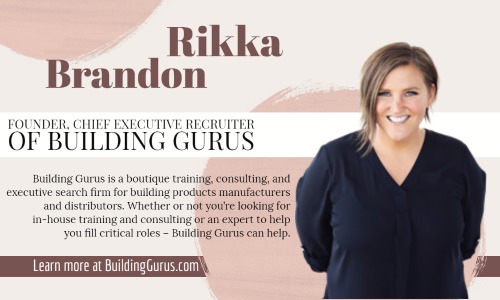Building Gurus: Done-For-You, Copy-And-Paste Interview Process

Do you find yourself dreaming about an endless stream of interviews? Are you tired of pretending your benefits package isn’t mediocre? Ready to talk to candidates who actually can do the job, not just give you a good line?
It sounds like you are ready for a bit of an overhaul to your hiring and interview process. I’ve been recruiting in the building products industry for 14+ years, so I get it. But, I’ve found a better way and I want to share it.
My proven interview routine will help you get reinvigorated and make sure you don’t get overwhelmed. It will help you stay on track. You won’t waste time on the wrong people anymore. And, best of all, you can copy the entire thing for free!
Deal Breakers
Pretty much every role has some deal breakers – for both clients and candidates. The branch might be in a bad location or require a lengthy commute. Possibly you are open weekends or have extended hours. If your salary or benefits package isn’t the greatest or you have anything else that could be seen as a negative, you have to deal with it head-on.
Also, you have requirements for what you need in an employee or items that will be a turn-off. What specific experience does the candidate need to have? Do they have to have a degree or be able to travel for work?
I start my interviews with deal breakers. If you can find out right away the role won’t be a fit, you can both walk away without spending any more time.
Start With A Phone Interview
Even if your candidates are local, I highly recommend a phone interview. I love a phone interview because it saves time and it lets you focus on the answers. Also, phone interviews can be super brief without anyone getting upset about the effort they put into it.
I would try to make your first interview more of a quick screening call. You can cover the deal-breakers, get some basic information about the candidate’s background and experience and decide if they are going to move on to the next step.
I try to focus solely on working through their history and background and the skills they need to succeed. Do they have the right product mix experience? Have they managed a team? What size territories have they been responsible for?
A Quick Note About Theory
Each point of the interview process is a narrowing step towards a small pool of highly qualified candidates. I might review 500 resumes, contact 100 candidates, screen 35, cover deal breakers with 20, interview 10 and submit 3-5. You can do the same.
If you keep this theory in mind, you will have a much easier time deciding if someone is a YES, MAYBE or NO for moving forward.
Face-to-Face Or Video Interview
In-person interviews are an indispensable part of the process. You learn a lot about a candidate’s communication style over the phone, but seeing them brings everything else into focus. Do they make eye contact and smile? Are they professional, how do they carry themselves? Sometimes logistically a video interview is necessary and they work just as well.
Use this time to ask detailed behavioral and situational interview questions. You’ll get some insight into their past behavior and performance and future potential using a mix of both. For instance: “Give me an example of a time a customer was upset with your delivery process and how you resolved it.” “Tell me about a time you had to re-assign sales territories and how you handled it.”
This is where you really want to focus on what the candidate has accomplished and what they can do in the future. You are looking to make sure they will fit in with your culture, company, role and teams.
Utilize Great Selection Tools
Once you get down to a handful of great candidates, you may want to consider pre-employment assessments. These assessments give you more of an insight into how the candidate’s mind functions. Two I like are the DiSC or Wonderlic tests, but there are many tools you could use.
I also highly recommend a pre-hire project to uncover the candidate’s strengths and how well and quickly they complete a task. This could be any type of project someone in the residential building products industry would be expected to do on a daily basis.
Selection tools should be at the end of the hiring process and ideally only run on 2-3 candidates max. You use these to confirm your choices and to prove the candidate has the necessary skills to succeed.
Make a Job Offer
This is the best part of the interviewing process! If you follow the previous steps, everything should be coming together. Your candidate should have everything they need to make a decision. You should know you have found the exact right person.
Speak to the applicant about compensation, benefits and anything else that makes up your proposal. Make sure you cover necessary paperwork like non-compete forms, drug testing, and non-disclosure agreements.
Generally, my clients will extend a verbal offer by phone and follow that up with a formal, written offer of employment. You are able to answer candidate questions and express your enthusiasm and excitement better over the phone.
If you follow this guide for successful interviews, you should have a much easier time and a higher rate of interview satisfaction.
Need help with your interview skills?
To view the original post, click here.
Source: Building Gurus



